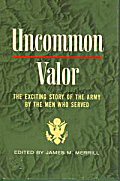
Uncommon valor (előszó)
UNCOMMON VALOR endeavors to recapture the spirit of the United States Army by playing the spotlight on personalities. These include private and noncom, shavetail and brigadier general, the great and the near-great who shaped events, the obscure whose lives were touched by them. This book tells the story of the United States Army in the words of the men who served. They saw the British "a-comming" at Lexington and Concord, smashed the Redcoats at New Orleans, dodged through the bloody streets of Monterrey, faced Confederate bullets at Gettysburg, sloshed through the mud of the Philippines, scrambled over the top in France, and triggered the bomb releases in the flaming skies over Tokyo and Berlin. Some of the men who fought through America's wars, from Washington to Eisenhower, were destined to become Presidents of the United States.
In those long uneventful days of peace between wars, the average American mentally relegated the Regular Army to the status of an unglamorous organization off on distant posts or standing guard at picturesque forts, where they drilled a little, danced a good deal, and paraded on national holidays. But from the days of Lewis and Clark in the first years of the nineteenth century, the development and settlement of our country was largely through the agency of the Regular Army. By the sweat, muscle, and raw courage of its men, the Army conducted the preliminary explorations, built the roads, protected settlers, and drew the maps for the winning of the West. Beyond this, in crisis and disaster, the peacetime Army quashed insurrections, succored flood and earthquake victims, conquered tropical diseases, and pioneered aviation.
In the United States the majority of the men in the ranks have always been able to read and write. These soldiers scribbled letters, jotted in diaries, and meticulously made official reports. They described the Army to the folks back home, set down their daily routine in journals or, from the perspective of retirement, recalled the flash of guns and the smell of powder.
To paint the color and action of the past, to revive the clash of arms, I have riffled through countless personal letters, diaries, autobiographies, official correspondence, articles, unit histories, and recruiting pamphlets. Many of them are published here for the first time. The problem has not been what to include but what to exclude.
Raw recruit and thirty-year veteran have been asked to talk in their own words, write in the grammar and spelling that suits them best. These diaries and letters reflect their attitudes toward war, toward the enemy, toward life in the Army. These soldiers are not fond of flag-waving or mouthing the loud hurrah of patriotism. About their cause they say little. It is taken for granted. Earthiness and toughness are hallmarks of this male world—it shows in their language, their humor, and in their valor under fire.
This editor has done no more than arrange the letters and reports chronologically and, in prologues and notes, explain briefly the action. In accordance with accepted practice, I have deleted the trite and the unimportant and have broken up over-long paragraphs. The original meaning remains unaffected.
I am appreciative of the research grants from the Mershon Center on Education in National Security and the John and Dora Haynes Foundation, the latter through the auspices of Whittier College. For their encouragement I thank Dr. John H. Kemble of Pomona College, Dr. Brainerd Dyer of the University of California, Los Angeles, and Dr. Albert Upton, Dr. Benjamin Whitten, and Mrs. Ann Farmer, all of Whittier College. For their typing skills, I thank my students Linda Rawlinson and Michael Mitchell. Lastly, for help and support, I thank Ann, my wife.
JAMES M. MERRILL
Whittier, California